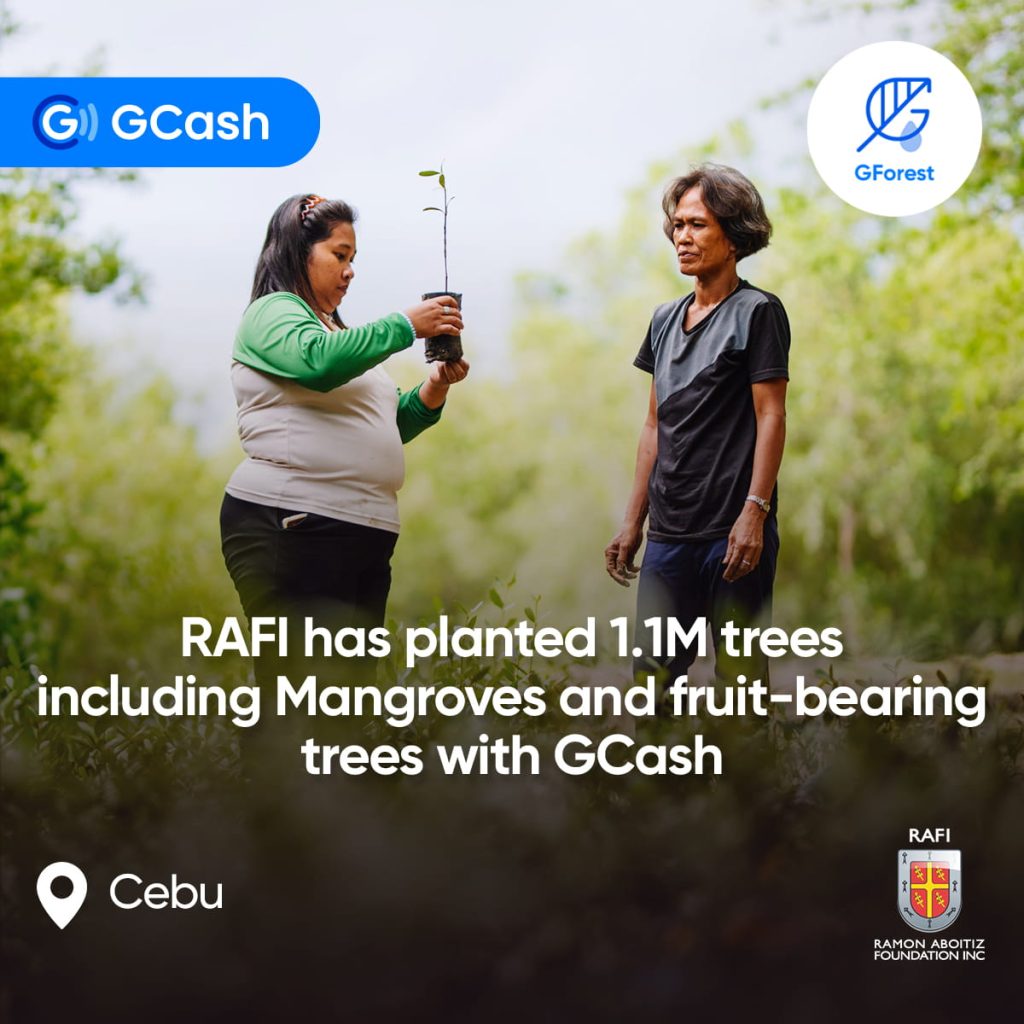Five new types of trees, including molave and mamalis, now available via GForest for planting in Carcar, Cebu to increase forest coverage and enhance existing mangrove areas in celebration of Philippine Arbor Day

A total of 1,150,000 mangroves and upland trees have been planted across key sites in Cebu since 2021, as part of a partnership between the Ramon Aboitiz Foundation Inc. (RAFI) and the Philippines’ leading finance app GCash.
GCash, through GForest, and RAFI, through its “One to Tree” program, have collaborated to plant trees to mitigate the effects of climate change and provide livelihood opportunities to surrounding communities.
The partnership comprises three initiatives, with the first two based in the Luyang Watershed in the northern town of Carmen. One spans 375 hectares of land in the barangays of Caurasan, Upper Natimao-an, Liboron, Ipil, Cantumog, and Lower Natimao-an. The other covers 355 hectares of land, with planting sites in the barangays of Upper Natimao-an, Corte, Ipil, Caurasan, Hagnaya, Lanipga, and Cantumog.
A total of 600,000 trees were planted in the two areas. These include native trees, such as bangkal, mamalis, molave, nangka, and narra, as well as fruit-bearing trees, such as avocado, cacao, cashew, coffee, guyabano, mangosteen, and rambutan, with a high survivability rate of up to 93% as of December 2023.
The Luyang Watershed is a significant ecological area in Cebu, supplying at least 24,000 cubic meters of surface fresh water. The enhancement of tree cover in the two areas is expected to improve rainwater percolation. This, in turn, will increase the water table under the horizon that supplies springs that support surface water along rivers. The neighboring urban cities of Cebu, Mandaue, and Lapu-Lapu will see benefits regarding their water supply.
The third initiative involved the planting of 550,000 mangrove seedlings in Daanbantayan, San Remigio, and Medellin. The three municipalities face the Tañon Strait, the biggest marine protected area in the Philippines under the National Integrated Protected Areas System.
As of December 2023, about 60.5 hectares have been dedicated to enrichment planting via 550,000 seedlings of several different species: the bakhaw lalaki (Rhizophora apiculata), bakhaw babae (R. mucronata), bakhaw bato (R. stylosa), bungalon (Avicennia alba), miapi (A. marina), A. officinalis, A. rumphiana, pagatpat (Sonneratia alba), pedada (S. caseolaris), and S. ovata.
In addition to mitigating the risks of natural disasters and augmenting the water supply, the far-reaching project has provided livelihood opportunities in surrounding local communities, as RAFI has given incentives to farmers planting and maintaining mangroves. In total, GCash and RAFI have engaged 164 landowners, 1,965 individuals, and 18 people’s organizations in the site preparation, tree-planting, and maintenance activities of the project.
“This partnership with GCash allows us to reach more people and enable them to take part in caring for our environment even in simple ways. Through this partnership, people can build forests one tree at a time, and also help in community-building and income augmentation of locals. This is a win for the environment and a win for Cebuanos,” Amaya Aboitiz-Fansler, RAFI president and CEO, said.
Turn green energy points into new trees available on GForest
In celebration of Philippine Arbor Day, five new tree types will be available on GForest, to be planted by RAFI in Carcar, Cebu: molave, mamalis, jackfruit, guyabano, and avocado.
GForest is a not-for-profit initiative. It is a platform that makes it easy for GCash users to give back to the environment by planting a diversified selection of trees. GCash app users generate green energy which they can collect and convert into digital actual trees. In turn, GCash together with its international and local partners like RAFI, plant actual trees around the country at no cost to GForest users.
This digital eco-movement aims to help address both biodiversity and the socioeconomic needs of local smallholder farmers. To date, GForest has planted about 2.8 million trees of various species across the Philippines—ranging from mangroves (such as tabigi and tangal) to native (such as malapapaya and narra) and fruit-bearing trees (such as coffee and coconuts) for agroforestry assistance.
As a science-based endeavor, GForest and its partner-organizations consult environmental experts for its initiatives to determine the ideal species for a site and to ensure that planted seedlings have high survivability rates.
“The success of our Cebu initiatives with RAFI proves that by leveraging the power of collaboration and science-based innovations, we can make meaningful progress in our pursuit of a greener and more sustainable world. We are grateful for RAFI and all our partner-organizations, and especially for the dedicated advocacy of our GForest users, for continuing to plant the seeds for a better tomorrow,” said CJ Alegre, GCash head for sustainability.
For more information about GForest and other sustainability initiatives, visit www.gcash.com.
